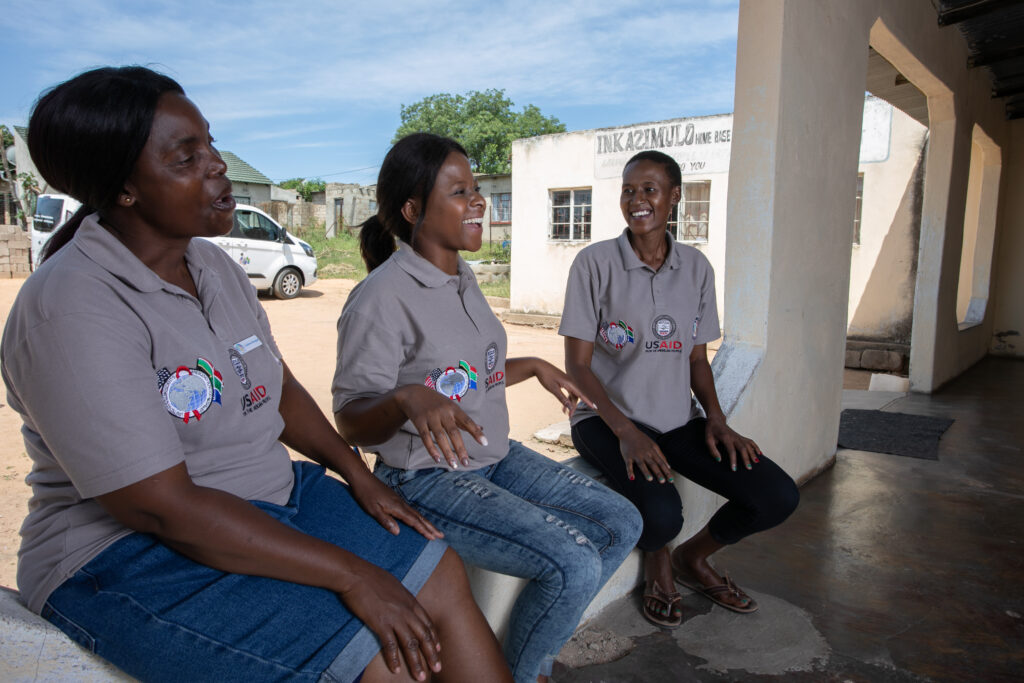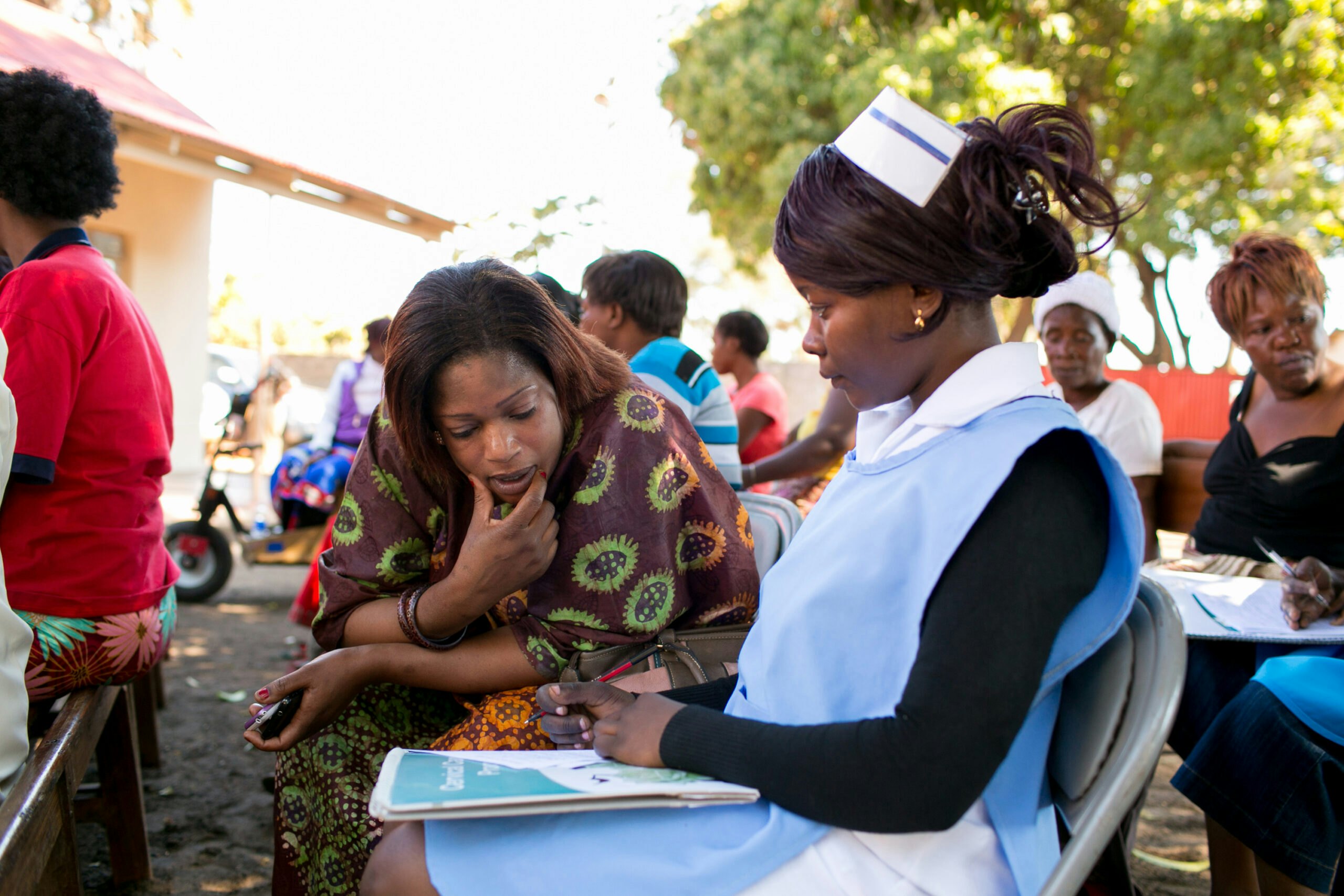Since 2001, mothers2mothers – funded in part by the President’s Emergency Plan for AIDS Relief (PEPFAR) — has employed local women living with HIV as community health workers to meet the growing needs of communities across Africa. These women, known as “Mentor Mothers,” work in local communities and at health centers providing health services, education, and support to women, children, and their families.
I recently had the opportunity to speak with a beneficiary of the organization, Esther Mamba. At 22, Esther learned she was living with HIV while pregnant with her first child. Through mothers2mothers, Esther learned how to live a healthy and happy life and give birth to two HIV-negative babies.
Esther is now an employee of mothers2mothers, providing health services and support to orphans and vulnerable children and adolescents through a program called Children and Adolescents Are My Priority (CHAMP) in Mpumalanga, South Africa, which receives funding from PEPFAR. Read our conversation below.
Hannah Johnson: Can you tell us about your life and what’s important to you?
Esther Mamba: My life started as a nightmare. I was 22 when I was pregnant with my first child. That’s when I was diagnosed with HIV. I felt like my life had come to an end. Really, it was not good at all. At the health facility where I was, there was a mentor from mothers2mothers. She’s the one who mentored me and told me that it is possible to live with HIV. So she made me who I am today – the beautiful Mentor Mother at the health facility.
Hannah Johnson: That’s incredible. What makes you most proud to be a mom?
Esther Mamba: I’m very, very, very proud. I have two beautiful children, a 14-year-old son and a daughter who turned 10 on Nov. 21. I gave birth to them while I was HIV-positive, and both of them are HIV-free. That makes me very proud because of the knowledge that I gained from those Mentor Mothers from mothers2mothers.
Hannah Johnson: What hopes and aspirations do you have for your children?
Esther Mamba: Both of my children are very close to my heart. They are what I’m living for – seeing them grow healthy and strong each day. For me, I wish them all the best that they can achieve in life and to be an inspiration to their peers as well.
Hannah Johnson: I’m sure they’re inspired to have you as a mom. So how long have you been with mothers2mothers and how did you start working for them?
Esther Mamba: It’s been 14 years now… My journey with mothers2mothers started in 2009 as a client … going through the PMTCT program, which is Preventing Mother to Child Transmission… It was funded by PEPFAR. Everything went well with me. Then mothers2mothers decided to take me on board because it was also my wish to be part of these Mentor Mothers to bring back to my community, also to change other people’s lives as the Mentor Mothers did for me.
So after being a client, I got employed by mothers2mothers as a Mentor Mother myself. I’m now doing the job that was done for me. Then I got promoted as a supervisor – they call them case coordinators for Mentor Mothers. And today I’m a linkage assistant… My role is to make sure that I do all the referrals… of Mentor Mothers. When they package their services, I’m the one making sure that all of those who were given those services, they got the services at the right time, at the right place.
Hannah Johnson: That is amazing. So you’ve been with them for 14 years and you have really just grown with them, too, in your roles.
Esther Mamba: A lot. A lot. Because we started with the Preventing Mother to Child Transmission program. Now we have the CHAMP program, which is called Children in Adolescents Are My Priority. This is an OVC program. OVC means Orphans and Vulnerable Children. So our duties in the OVC program, we knock on the doors in our communities, identifying all the children who are orphaned and vulnerable. Then make sure that we give them all the services that they need. Especially in the community that I’m coming from. It’s a bit of a rural community, and most of the household are headed by children. So they are child-headed families… they need our support a lot.

Hannah Johnson: Wow, that’s amazing! Mothers2mothers has introduced you to children beyond your family, is that right?
Esther Mamba: Yeah. Now I have one. He was my client, but he’s now my colleague. I found that guy, when he was 18 years old; now he’s 22. He was heading a child-headed household. Then I recruited him to the program. He was looking after his younger brother, who was 12. Then I mentored him, made sure that they were getting all the health services they needed, and also connected them because they were only living with a support grant, which is 500 rand in South Africa (just over $26 U.S. dollars, according to the current exchange rate).
So I made sure that I connected them to a security grant agency to increase their grant … to a foster care grant, since they don’t have parents. So now they’re getting the foster care grant, which is now 2,050 rand (around $108 U.S. dollars). Then he was enrolled at iCOLLEGE through our referrals. So he’s now a qualified IT technician. From being an orphan doing nothing, he’s now an IT technician. He’s also a data filer with us at mothers2mothers.
Hannah Johnson: You just do so many amazing things. So how has mothers2mothers helped you to best support your children, especially when you first met the organization?
Esther Mamba: I’m very proud of working for this organization. At most nongovernmental organizations, people are volunteering, but with mothers2mothers, we are getting paid. So we are able to provide for our children. Not only that, but also when I got to mothers2mothers, I only had a matric certificate (equivalent to a high school diploma in South Africa). I then got a bursary (or a form of financial support) for studying, and then I studied. I graduated last year, December. I studied HIV/AIDS counseling management. So now I’m a graduate. I’m qualified, and my kids are so proud of me. So my life has changed a lot because my qualification is not ending with mothers2mothers. I’m still going to take it further.
Hannah Johnson: That is so amazing. Congratulations too. That’s a big deal to be able to do that and have two almost teenagers. So how has mothers2mothers changed your life? What do you wish people knew most about your experience?
Esther Mamba: I want people to know that nothing is impossible in life, especially if you have support. If you have people that can support you, like the Mentor Mothers did to me, everything is possible. I was hopeless back then, but now mothers2mothers gave me hope and also brought the light.
Hannah Johnson: That’s so lovely. How have you seen your community change as HIV testing and treatment became more available?
Esther Mamba: Because of the knowledge that the Mentor Mothers are giving out there, the community has now changed a lot because a lot of people now are getting tested and they are accessing their treatment and they know the benefits of getting their treatment and taking their treatment very well.
Hannah Johnson: That’s so great. And I’m sure there are women and people who live further away from clinics, so if they can just go and get it at the grocery store when they’re getting their groceries, that probably makes it easier too.
Esther Mamba: Yes, true. And our statistics are showing that a lot of impact is happening. Across the 10 countries where mothers2mothers operates, about 95% of women we serve were tested for HIV in 2022. They know their status. Then about 98% also accessed their treatment. And about 97% of clients who are children, age 3 to 9, also accessed their treatment. So the statistics are showing that it’s happening.
Hannah Johnson: Can you describe the most significant milestone you’ve seen in HIV for women and for mothers?
Esther Mamba: Protecting our babies from contracting HIV and also making sure that our women stay alive and healthy. That’s the biggest milestone. And also for PEPFAR to be there as a funder. About 5.5 million babies have been saved overall because of PEPFAR funding, including the grants to mothers2mothers. So as Mentor Mothers from mothers2mothers, we are also proud of ourselves that a lot of children could have died because of HIV, but most of them, they are now still alive, healthy, and they are the ones that we enroll or are taking care of in the CHAMP program. The children and adolescents are my priority. This is the generation for which mother to child transmission was prevented.
Hannah Johnson: That is so important. The fact that you’re continuing that care is just really incredible. What part of your work are you most proud of?
Esther Mamba: Being part of the community. Working for the community, because what I love the most about my organization, mothers2mothers, is that they employ us from the community to work for the same community. So these people, they see us, they know us, and they trust us. So it’s easy to access them or for them to access us when they need knowledge. So it’s not like I’m a stranger to my community. That’s the most important part and the proudest part – that I’m a role model to my community.
Hannah Johnson: What are your dreams for your future or the future of your family or your community?
Esther Mamba: For my family, I want them to reach their goals and also to be strong and healthy while I’m still alive. For my community, … I want them to pass the knowledge to the next generation. Those that we taught… must pass the knowledge to the next generation so that we don’t lose the knowledge. Mothers2mothers is there, but because we’re passing the messages to the ones that we are working with now, we’re hoping and trusting that they’re passing the message to others as well.





























